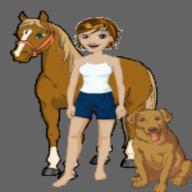我想問分子(molecules)同粒子(particles)有乜分別??
ps: (答案最好中英對照)
我想問分子同粒子有乜分別??
2006-10-18 2:55 am
回答 (4)
2006-10-18 2:59 am
✔ 最佳答案
什 麼 是 分 子 ? 分 子 是 擁 有 該 物 質 化 學 特 性 的 最 小 單 位 。 如 把 分 子 繼 續 分 拆 為 更 小 的 單 位 , 則 會 失 去 其 物 質 的 原 本 特 性 。 如 水 分 子 是 由 兩 個 氫 及 一 個 氧 原 子 組 成 , 若 把 一 杯 水 樣 本 分 開 為 兩 份 , 兩 份 樣 本 也 有 水 的 化 學 特 性 。 如 不 斷 細 分 , 最 終 得 出 最 小 單 位 會 是 水 的 分 子 。 倘 若 再 分 為 氫 及 氧 的 原 子 , 那 麼 便 沒 有 了 水 的 化 學 特 性 了 。
什 麼 是 原 子 ?
大 大 小 小 的 分 子 , 都 是 由 一 些 更 小 的 " 微 粒 " - 原 子 所 組 成 的 。 原 子 差 不 多 是 物 質 的 最 小 單 位 。 原 子 "atom" 源 自 希 臘 文 , 本 是 不 可 分 拆 的 意 思 。
原 子 裡 有 更 小 的 粒 子 嗎 ?
有 。 二 十 世 紀 初 , 人 們 發 現 原 子 是 由 電 子 和 原 子 核 組 成 的 。 而 原 子 核 還 可 以 分 成 更 小 的 粒 子 !
起 初 , 人 們 只 發 現 了 電 子 、 光 子 、 質 子 、 中 子 四 種 。 後 來 , 又 發 現 了 正 電 子 、 中 微 子 、 介 子 、 超 子 、 變 子 等 , 統 稱 為 " 基 本 粒 子 " 。 基 本 粒 子 的 種 類 很 多 , 據 統 計 , 目 前 已 發 現 的 基 本 粒 子 近 300 種 , 而 且 還 在 不 斷 發 現 中
分子(molecule)再細就係原子(atom)
原子再細就係電子(electron), 中子(neutron)同質子(proton)
中子同質子再細就係夸克(quark)
粒子(particles)泛指所有微粒
就算一粒塵, 都可以叫做粒子..!!
即係話, 無論一粒塵, 分子, 原子, 質子電子中子乜子都好= =
都係叫粒子
2006-11-02 5:44 am
未有細解箇中「分別」,夾雜大量無關資訊,不符問者要求。高有龜君的答案反而更好。顯示了投票者崇拜先到先得主義的可悲。
此答案末段的歸納更是毫不專業。只能說某甲物之所組成者為某乙物,豈能說什麼「再細就係」什麼?再者,答者並未解說分子之共價性,且錯誤理誤「塵」的質性──我們所理解塵在化學上明明是具體有形的混合物,豈能與粒子相提並論?
還有,答者漠視知識產權,無視原創者而不註出處,希望日後留意。
此答案末段的歸納更是毫不專業。只能說某甲物之所組成者為某乙物,豈能說什麼「再細就係」什麼?再者,答者並未解說分子之共價性,且錯誤理誤「塵」的質性──我們所理解塵在化學上明明是具體有形的混合物,豈能與粒子相提並論?
還有,答者漠視知識產權,無視原創者而不註出處,希望日後留意。
2006-11-02 5:15 am
睇左其他答案, 再睇返呢個...
唔好意思, 我真係冇辦法唔負評你 = =
唔好意思, 我真係冇辦法唔負評你 = =
2006-10-18 3:02 am
定義上,粒子和分子有甚麼分別呢?
分子
分子是能單獨存在、並保持純物質的化學性質的最小粒子。
一個分子是由多個原子(atom)在共價鍵(covalent bond)中透過共用電子連接一起而形成。它可以由相同化學元素的原子組成,如氧氣 O2;也可以是不同的元素,如水分子 H2O。由分子組成的物質有水、大多數有機化合物、球蛋白和病毒等。非分子組成的物質有金屬、離子合成物似及金剛石等。
粒子
只能在字典中查到,解作very small bit or piece,即極小的一塊東東。
其實在科學上,分子的定義比粒子的定義精確得多,因為分子是一個認可的科學詞彙(scientific term),而粒子則是一個廣義的詞彙。
分子只可以是由多個原子組成的結構,若該分子由數千粒原子組成,就會被稱為巨大分子(macromolecule),仍可被列為分子。
然而當一件有相當質量的固體物件中,原子全數以共價鍵連接時,即組成一個giant covalent structure時,就不算是分子了(例如鑽石)。
粒子的應用範圍很廣,在科學範疇上,粒子沒有特殊定義,可以指原子、分子、質子、中子、電子、離子等,甚至有些比較不為人熟悉的例如光子、夸克等等,都可以粒子概稱。(正如香蕉、蘋果、橙也可以用水果概稱。)
但其實在生活中,粒子更是一個普通詞語,一塊頭皮、一粒塵、一粒碳灰、一粒粉筆粉等等,都可以用粒子代稱。
---------------English Time--------------------
Defines, what the granule and do the member have to distinguish?
Member
The member is can alone exist, and maintains pure material the chemical property smallest granule.
A member is (covalent bond) penetrates by many atomic (atom) in the covalent bond uses in common the electronic connection to form together. It may by the same chemical element atomic composition, like oxygen O2; Also may be the different element, like hydrone H2O. Has the water, the majority organic compounds, the globulin and the virus by the molecular composition material and so on. The presumptuous sub-group becomes the material has the metal, the ion complex resembles and the diamond and so on.
Granule
Only can look up in the dictionary, the solution makes very small bit or piece, namely minimum together east east.
In its solid science, the molecular definition is much more precise than the granule definition, because the member is an approval scientific glossary (scientific term), but the granule is a generalized glossary.
The member only may be by many atomic composition structure, if this member of several thousand grain of atomic compositions, can be called huge molecular (macromolecule), still might list as the member.
However when has in the suitable quality solid thing, when atomic total by covalence keying, when namely composes giant covalent structure, was not considered as the member (e.g. diamond).
The granule application scope is very broad, in the scientific category, the granule does not have the special definition, may refer to the atom, the member, the proton, the neutron, the electron, the ion and so on, even some comparison manner familiar for example photon, quark and so on, may not the granules call generally. (Just like banana, apple, orange also may use fruit to call generally.)
But it really lives, the granule is ordinary words and expressions, scalp, grain of dust, grain of carbon ash, grain of chalk powder and so on, all may use the granule synonyms together.
2006-11-01 21:57:18 補充:
惡意負評者奪得去你的分數,奪不去受惠者給你的心意,更奪不去我們對你的支持。請加油。
分子
分子是能單獨存在、並保持純物質的化學性質的最小粒子。
一個分子是由多個原子(atom)在共價鍵(covalent bond)中透過共用電子連接一起而形成。它可以由相同化學元素的原子組成,如氧氣 O2;也可以是不同的元素,如水分子 H2O。由分子組成的物質有水、大多數有機化合物、球蛋白和病毒等。非分子組成的物質有金屬、離子合成物似及金剛石等。
粒子
只能在字典中查到,解作very small bit or piece,即極小的一塊東東。
其實在科學上,分子的定義比粒子的定義精確得多,因為分子是一個認可的科學詞彙(scientific term),而粒子則是一個廣義的詞彙。
分子只可以是由多個原子組成的結構,若該分子由數千粒原子組成,就會被稱為巨大分子(macromolecule),仍可被列為分子。
然而當一件有相當質量的固體物件中,原子全數以共價鍵連接時,即組成一個giant covalent structure時,就不算是分子了(例如鑽石)。
粒子的應用範圍很廣,在科學範疇上,粒子沒有特殊定義,可以指原子、分子、質子、中子、電子、離子等,甚至有些比較不為人熟悉的例如光子、夸克等等,都可以粒子概稱。(正如香蕉、蘋果、橙也可以用水果概稱。)
但其實在生活中,粒子更是一個普通詞語,一塊頭皮、一粒塵、一粒碳灰、一粒粉筆粉等等,都可以用粒子代稱。
---------------English Time--------------------
Defines, what the granule and do the member have to distinguish?
Member
The member is can alone exist, and maintains pure material the chemical property smallest granule.
A member is (covalent bond) penetrates by many atomic (atom) in the covalent bond uses in common the electronic connection to form together. It may by the same chemical element atomic composition, like oxygen O2; Also may be the different element, like hydrone H2O. Has the water, the majority organic compounds, the globulin and the virus by the molecular composition material and so on. The presumptuous sub-group becomes the material has the metal, the ion complex resembles and the diamond and so on.
Granule
Only can look up in the dictionary, the solution makes very small bit or piece, namely minimum together east east.
In its solid science, the molecular definition is much more precise than the granule definition, because the member is an approval scientific glossary (scientific term), but the granule is a generalized glossary.
The member only may be by many atomic composition structure, if this member of several thousand grain of atomic compositions, can be called huge molecular (macromolecule), still might list as the member.
However when has in the suitable quality solid thing, when atomic total by covalence keying, when namely composes giant covalent structure, was not considered as the member (e.g. diamond).
The granule application scope is very broad, in the scientific category, the granule does not have the special definition, may refer to the atom, the member, the proton, the neutron, the electron, the ion and so on, even some comparison manner familiar for example photon, quark and so on, may not the granules call generally. (Just like banana, apple, orange also may use fruit to call generally.)
But it really lives, the granule is ordinary words and expressions, scalp, grain of dust, grain of carbon ash, grain of chalk powder and so on, all may use the granule synonyms together.
2006-11-01 21:57:18 補充:
惡意負評者奪得去你的分數,奪不去受惠者給你的心意,更奪不去我們對你的支持。請加油。
收錄日期: 2021-04-12 15:43:19
原文連結 [永久失效]:
https://hk.answers.yahoo.com/question/index?qid=20061017000051KK03032




